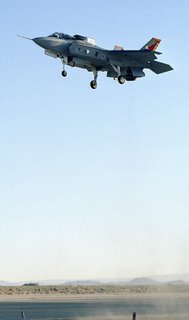 Only a few weeks ago we highlighted what we considered a "grave and important development" – the Bush administration conceding defeat on the ITAR "waiver", under the combined assault of representatives Hyde and Hunter.
Only a few weeks ago we highlighted what we considered a "grave and important development" – the Bush administration conceding defeat on the ITAR "waiver", under the combined assault of representatives Hyde and Hunter.This, we predicted, could have grave implications for the UK's co-operation on the F-35 Joint Strike Fighter, causing serious problems for the carrier programme, a view shared by some of the leading commentators in the field. In fact, on this one project, we warned in my publication the Wrong Side of the Hill, rests the fate of the "Special Relationship" with the United States.
Thus, today's report in The Sunday Times is little less than dynamite, although – amazingly – it is tucked away on page three of the business section. Headed: "Britain in battle with US over fighter plane", it reveals that Britain is threatening to pull out of the JSF programme, a move, confirmed by senior defence officials.
This is put down to "rows over the Pentagon’s reluctance to agree to the transfer of technology", and also to likely increases in the price of each aircraft.
It remains a measure of how far defence has slipped down the media agenda that - despiute its profound implications for our defence policy - this is written up as a business issue, the story pointing out that the "could have serious repercussions for BAE Systems and Rolls-Royce, Britain’s two main contributors to the project."
Correctly, the piece comments that "dropping the JSF would stun the defence industry, but a senior official told The Sunday Times it was time to 'think the unthinkable".' "I know how the Americans negotiate," said the official. "They will not do a deal unless they know the other side has a serious alternative. It's like a high-stakes poker game... it's essential to have a Plan B because it's very important not to travel in hope."
The "Plan B" supposedly being worked on is a version of the Eurofighter adapted for the navy. We are told that negotiations on the "Tranche 3" Eurofighter contract, under which Britain will take the last 88 of the 232 orders, is looking at the issues needed to be addressed to make the aircraft fly from a carrier. We are also told that "sources close to the Eurofighter programme say there are no major obstacles to the operation, although some elements of the carrier design would have to be changed."
This is, in fact, complete eyewash. The requirements for carrier operations would require a major and expensive redesign of the Eurofighter. For a start, to cope with the stresses of a catapult take-off and arrester-hook landing, major strengthening of the airframe would be needed. Then, as carrier aircraft perform what are known as "no-flare" landings (basically a "controlled crash" onto the deck), landing gear must be specially strengthened, with knock-on effects throughout the whole airframe.
On top of that, navalised aircraft need special measures for corrosion-proofing, against sea spray, with the substitution of some of the more vulnerable material, which has major weight and cost implications.
As to the carriers, Eurofighter would require a catapult launch, which needs high capacity steam generation, which in turn means that the proposal to power the ships by gas turbines would be unrealistic. Furthermore, major changes to the deck configuration would be needed which, together with power plant and other changes, would dictate an almost complete redesign of the ship.
Together with the costs of converting the Eurofighters, we are looking potentially at adding billions to the bill which is already over £13 billion for the entire package, putting the whole project in jeopardy.
One does hope that this is, as the ST intimates, a high-stakes poker game but, if it is, it is one in which Britain hold few cards. The US would, from all accounts, be quite happy to dump the STOVL version of the F-35, which would indeed leave the UK adrift, with the Special Relationship and our defence strategy in tatters.
COMMENT THREAD
No comments:
Post a Comment
Note: only a member of this blog may post a comment.